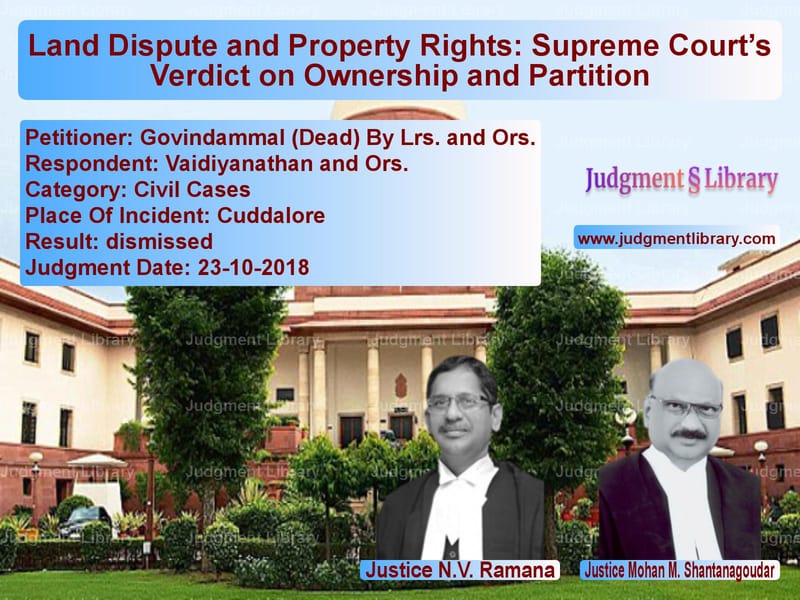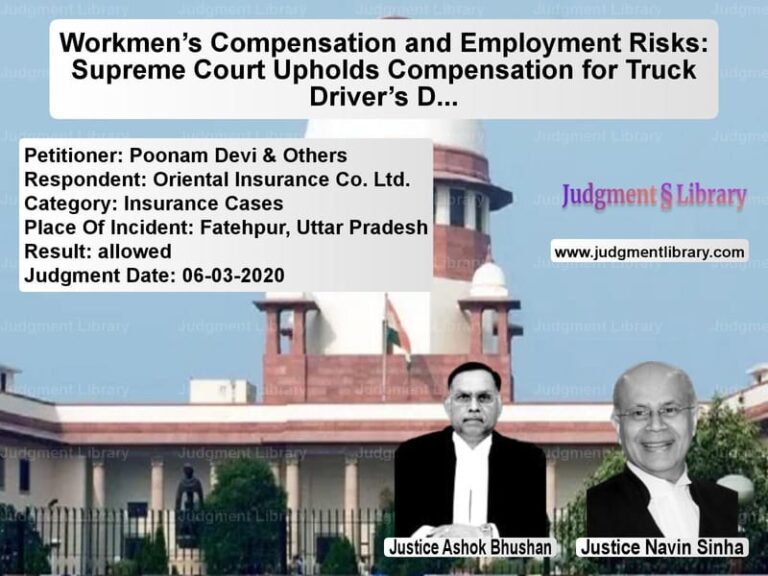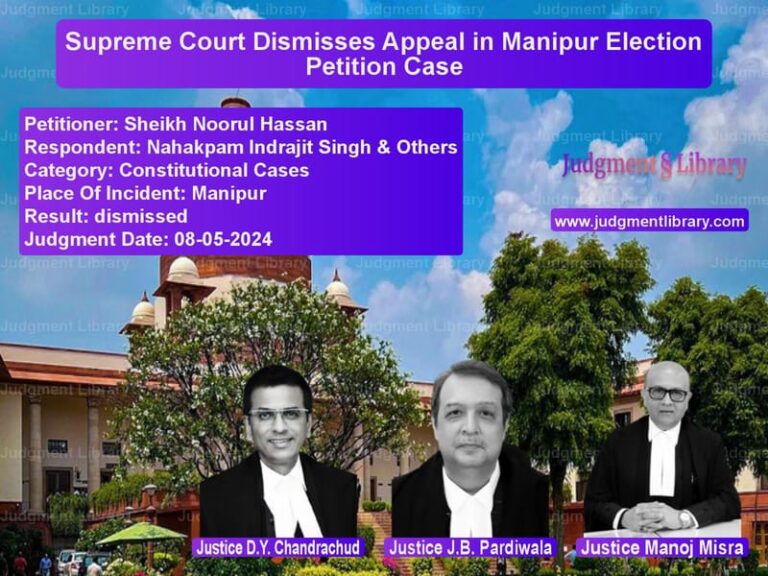Land Dispute and Property Rights: Supreme Court’s Verdict on Ownership and Partition
The Supreme Court of India recently addressed a long-standing land dispute between legal heirs regarding ownership and partition of ancestral property. The case primarily revolved around the question of whether the plaintiffs (respondents) were entitled to claim ownership over a specific portion of land and whether the auction purchase by the defendant’s father was legally valid over the entire property.
This case is significant as it delves into the legal principles governing property disputes, the concept of adverse possession, and the doctrine of res judicata as applied between co-defendants in previous litigations.
Background of the Case
The case was filed by the plaintiffs seeking a declaration that the ‘A Schedule’ property belonged to them. Alternatively, they sought partition of half share in the ‘B Schedule’ property, of which the ‘A Schedule’ was a part. The plaintiffs argued that the property initially belonged to two brothers, Pazanivelu Mudaliar and Chokalingam, and that in a partition dated 21.07.1912, the ‘A Schedule’ property was allotted to Narayanaswamy and Manickam (sons of Pazanivelu).
After several transactions involving the sale and repurchase of portions of this property, the plaintiffs, being grandsons of Narayanaswamy Mudaliar, claimed that they had inherited the property. Meanwhile, the defendant argued that his father had purchased the entire extent of the land in a court auction in 1933 and had been in uninterrupted possession since then.
Key Issues Raised
- Was the auction sale in 1933 legally valid over the entire property?
- Did the plaintiffs have a rightful claim over the ‘A Schedule’ property?
- Could the defendant claim adverse possession over the disputed land?
- Did the principles of res judicata apply due to past litigations?
Arguments of the Petitioners (Appellants)
- The appellants (legal heirs of the defendant) argued that the partition of 1912 had already determined the shares of the respective families.
- The auction sale of 1933 included the entire property, and possession was taken accordingly.
- Since the father of the plaintiffs had participated in previous litigations where the title of the defendant’s father was upheld, the plaintiffs’ claim should be barred by res judicata.
- The appellants also argued that they had been in uninterrupted possession since 1933 and had therefore acquired the property by adverse possession.
Arguments of the Respondents (Plaintiffs)
- The respondents contended that the 1933 auction sale could have only included Chokalingam’s share, which was half of the total property, as he was the judgment debtor in the execution proceedings.
- The plaintiffs were not parties to the previous litigations; thus, res judicata should not apply.
- They argued that their ancestors’ share in the property was never legally sold and had been inherited lawfully.
- The defendant’s claim of adverse possession was refuted, as they were never in exclusive possession of the property.
Supreme Court’s Analysis
The Supreme Court examined the legality of the 1933 auction sale and the subsequent transactions in light of established property laws. The court observed:
- Since Chokalingam was the judgment debtor, only his half share (1.36 acres) could have been sold in the auction.
- The auction purchaser does not acquire a title higher than that of the judgment debtor.
- The defendant’s claim of adverse possession was not supported by evidence proving exclusive possession over the plaintiffs’ portion of the property.
- Previous litigations were primarily against third parties (temple and school), and there was no conflict of interest between the plaintiffs’ and the defendant’s fathers in those cases. Thus, res judicata did not apply.
Final Judgment
The Supreme Court ruled in favor of the plaintiffs, upholding their ownership rights over the ‘A Schedule’ property. The key points of the ruling were:
- The plaintiffs had a legitimate claim over 50% of the total property as inherited property.
- The defendant’s claim over the entire property was invalid, as only Chokalingam’s share could have been auctioned in 1933.
- The doctrine of res judicata did not apply to this case.
- The claim of adverse possession was not substantiated, as both parties had been in joint possession of the disputed land.
The appeal was dismissed, and the judgment of the Division Bench of the High Court in favor of the plaintiffs was upheld.
Implications of the Judgment
This ruling reinforces the importance of properly analyzing auction sales in execution proceedings and ensuring that only the property belonging to a judgment debtor is transferred. It also clarifies the application of res judicata in cases where past litigations involved third parties rather than direct conflicts between the disputing heirs.
Furthermore, the case highlights the necessity of proving exclusive and uninterrupted possession when claiming adverse possession over a property. The judgment serves as a precedent for future disputes involving property inheritance and the rights of legal heirs.
Petitioner Name: Govindammal (Dead) By Lrs. and Ors..Respondent Name: Vaidiyanathan and Ors..Judgment By: Justice N.V. Ramana, Justice Mohan M. Shantanagoudar.Place Of Incident: Cuddalore.Judgment Date: 23-10-2018.
Don’t miss out on the full details! Download the complete judgment in PDF format below and gain valuable insights instantly!
Download Judgment: Govindammal (Dead) B vs Vaidiyanathan and Or Supreme Court of India Judgment Dated 23-10-2018.pdf
Direct Downlaod Judgment: Direct downlaod this Judgment
See all petitions in Property Disputes
See all petitions in Succession and Wills
See all petitions in Landlord-Tenant Disputes
See all petitions in Judgment by N.V. Ramana
See all petitions in Judgment by Mohan M. Shantanagoudar
See all petitions in dismissed
See all petitions in supreme court of India judgments October 2018
See all petitions in 2018 judgments
See all posts in Civil Cases Category
See all allowed petitions in Civil Cases Category
See all Dismissed petitions in Civil Cases Category
See all partially allowed petitions in Civil Cases Category







